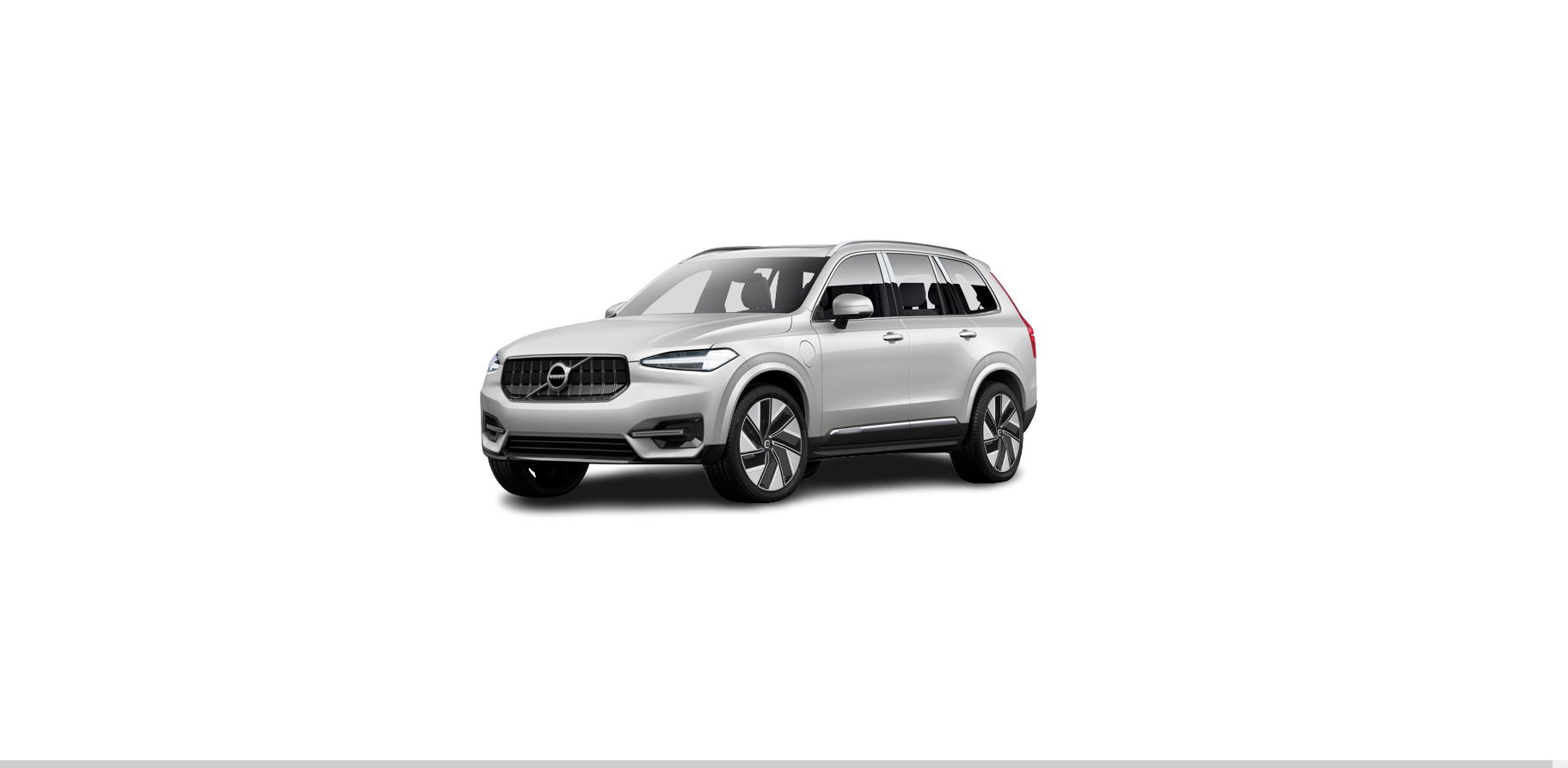2023 Volvo XC90 Cargo area
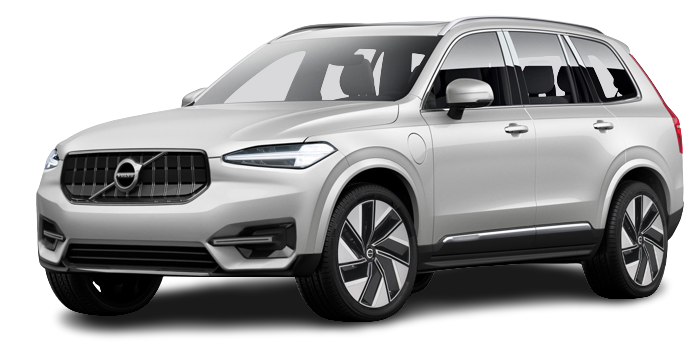
Cargo area
By folding down the backrests in the second and third(Option/accessory) rows of seats, the cargo area becomes quite spacious. To facilitate loading and unloading, the rear section of the car can be lowered with the level control function.(Option/accessory) Use load retaining eyelets or bag holders to secure the load, and the extendable cargo cover (Option/accessory) to conceal the load if desired.
The car’s towing eye and puncture repair kit or spare wheel (Option/accessory) are stored under the cargo area floor.
Bag hooks
There are two bag hooks in the side panel on each side of the cargo area.
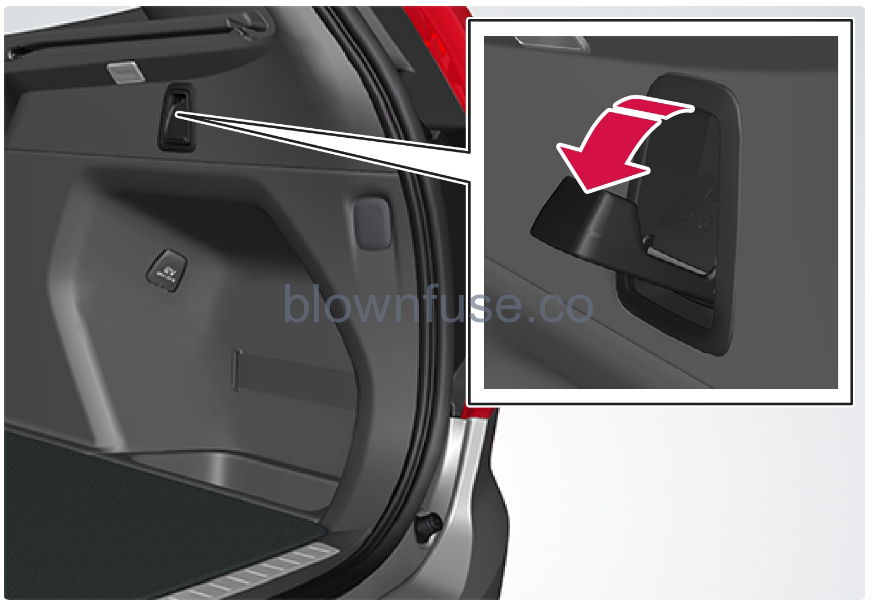
There are two extensible bag hooks in the side panels – one on each side of the cargo area.
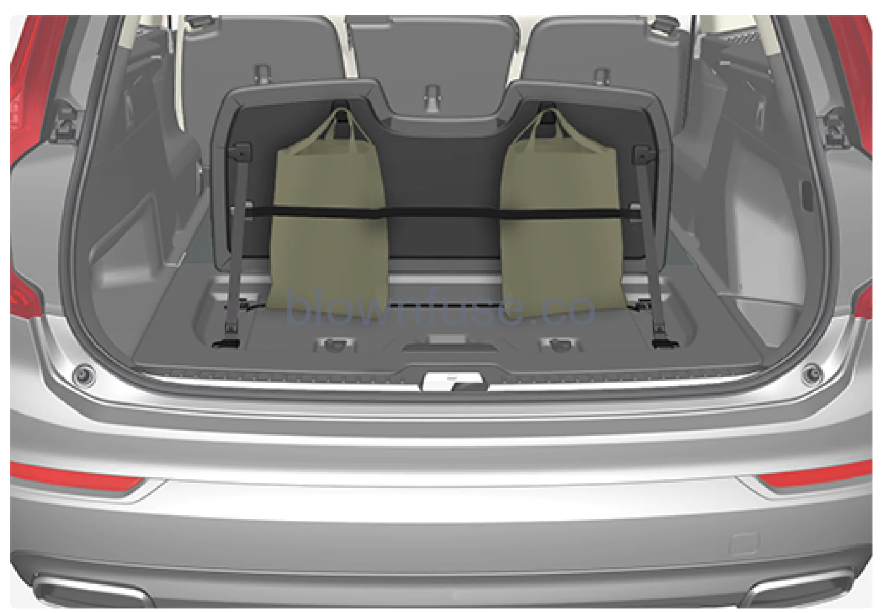
There are two bag hooks and an elastic strap(It is possible to reorder additional elastic straps at a Volvo dealer) in the cover, which is part of the floor hatch in the cargo area. The strap can be fitted in four different positions. Lift up the cover in order to use the bag hooks. Fasten the bags in a suitable position with the enclosed elastic strap. If the bags have handles and are a suitable height – hang them in the hooks.
First aid kit
(Option/accessory)
Store the first aid kit behind the elastic strap, if the car is equipped with one of these.
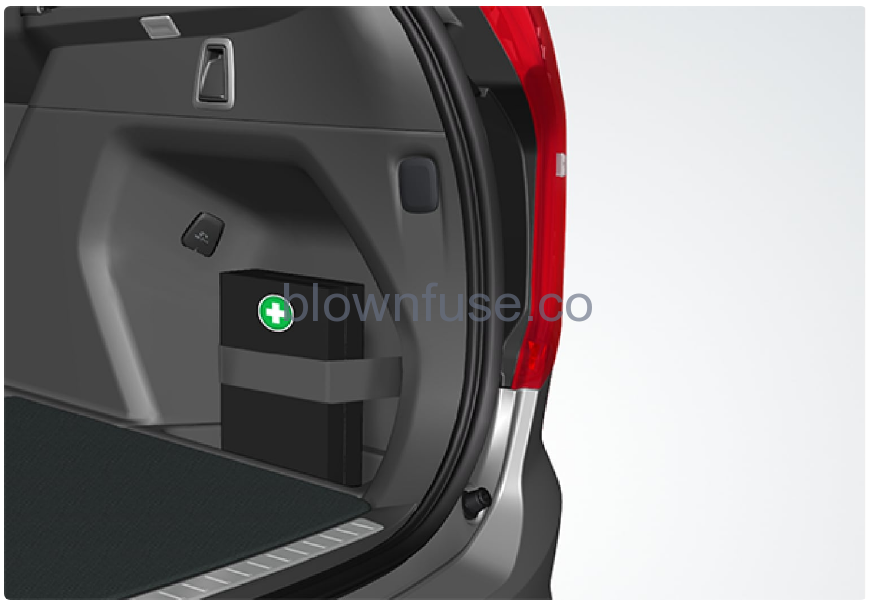
Load retaining eyelets
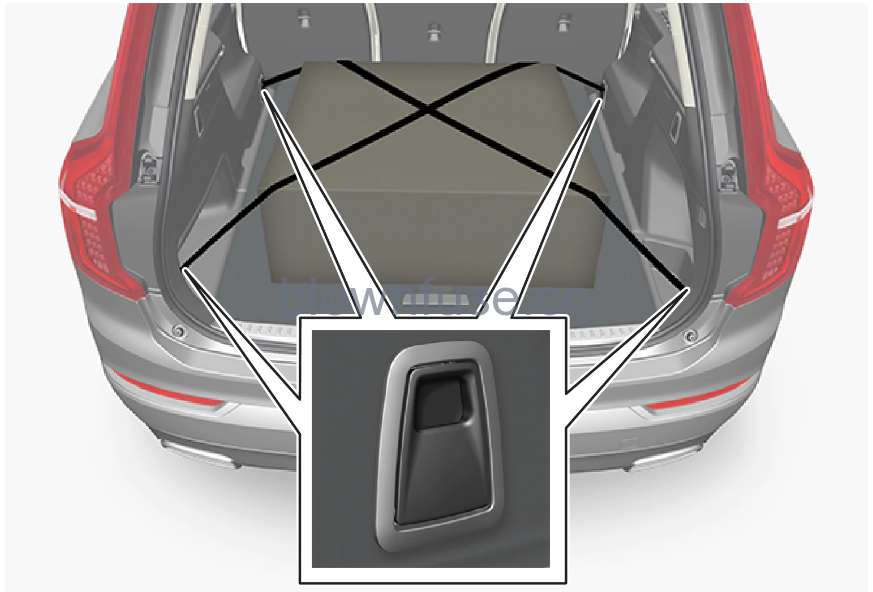
Always secure large and heavy objects with a seatbelt or cargo retaining straps.
Warning triangle
Also activate the hazard warning flashers.
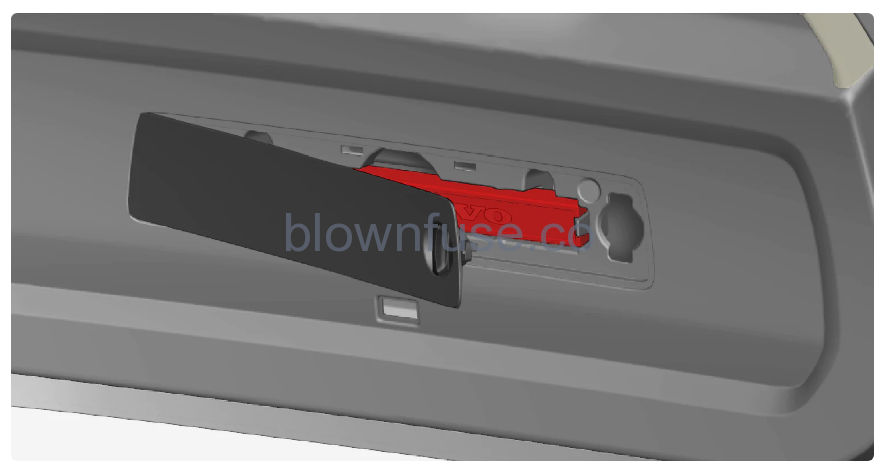
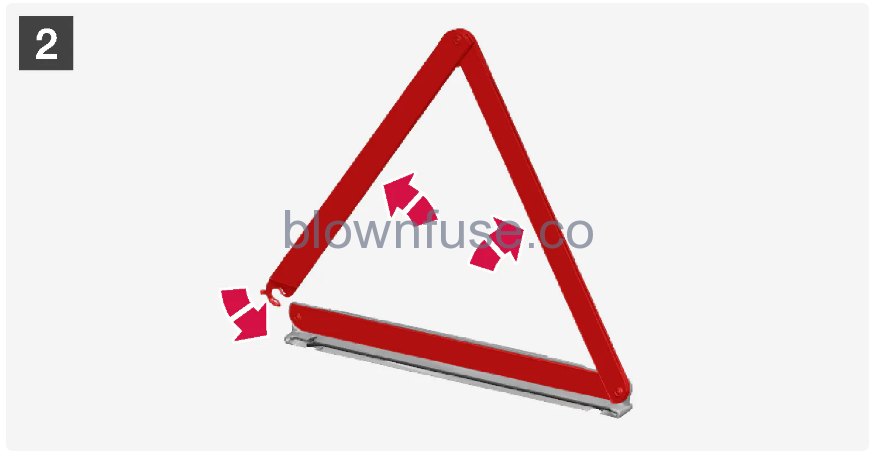
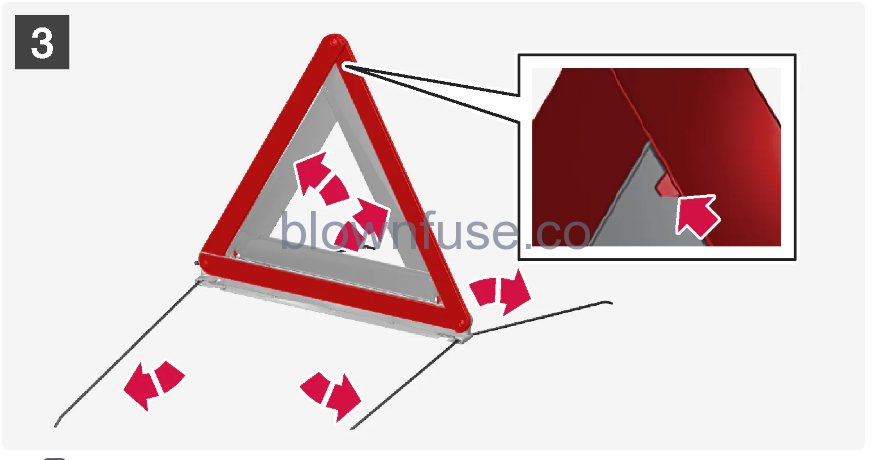
- Open the hatch by first turning the knob a quarter turn and then pulling the hatch from its brackets in the top and bottom edges. Press the latch that secures the warning triangle slightly to the right and remove the case.
- emove the warning triangle from the case, unfold it and put the ends together.
- Fold-out the warning triangle’s support legs.
Follow the regulations for the use of a warning triangle. Position the warning triangle in a suitable place with regard to traffic.
Make sure that the warning triangle and case are properly secured in their storage space and that the hatch is fully closed after use.
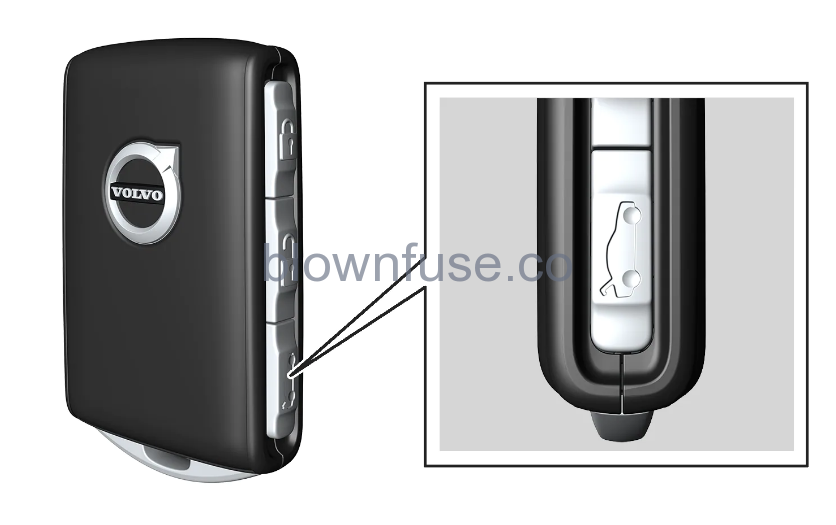
Press the key’s ![]() button.
button.
- The tailgate is unlocked but remains closed.
- The side doors are still locked and the alarm is armed. (Option/accessory) The lock and alarm indicator on the instrument panel extinguish in order to show that the entire car is not locked.
- You can open the tailgate by gripping the rubberized pressure plate underneath its lower edge.
- If the tailgate is not opened within 2 minutes then it is relocked and the alarm is re-armed.
Hold the key’s ![]() button depressed for a couple of seconds.
button depressed for a couple of seconds.
- The tailgate is unlocked and opened, while the side doors remain locked and their alarm functions armed.
Setting the max. opening for electrically operated tailgate
(Option/accessory)
- Open the tailgate manually – and stop it in the desired opening position.
- Press and hold the
 button on the bottom of the tailgate for approx. 3 seconds.
button on the bottom of the tailgate for approx. 3 seconds.
- Two acoustic signals sound to indicate that the set position has been saved.
- Open the tailgate manually to the fully open position.
- Press and hold the
 button on the bottom of the tailgate for approx. 3 seconds.
button on the bottom of the tailgate for approx. 3 seconds.
- Two acoustic signals sound to indicate that the set position has been cleared.
Operating the tailgate with foot movement
(Option/accessory.)
If the car is equipped with keyless locking (Option/accessory) and unlocking then you can unlock the tailgate using a foot movement.
The function with both opening and closing of the tailgate is also available when the car is equipped with power operated tailgate.(Option/accessory)
- Opening and closing with foot movement
- Only unlocking with foot movement (lift up the tailgate manually to open it)
Note that the function for opening and closing with foot movement requires power operated tailgate.(Option/accessory)
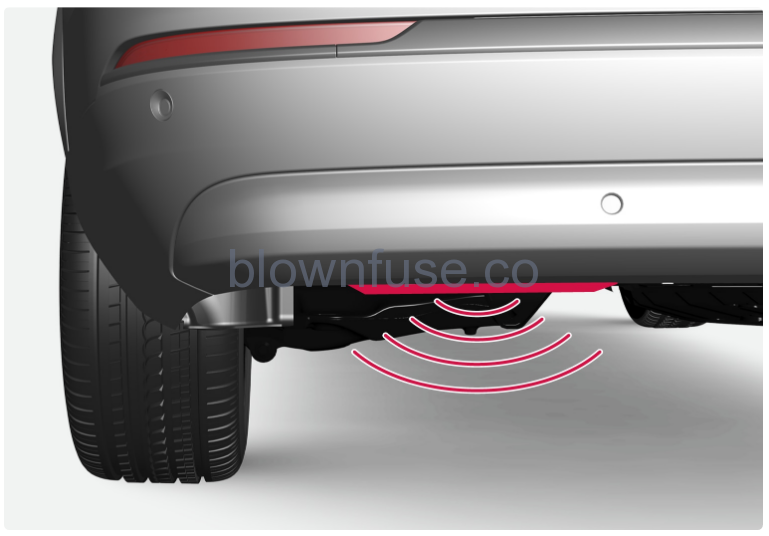
The sensor is located slightly to the left of the bumper.
One of the car’s keys must be within range behind the car, approx. 1 metre (3 feet), for opening and closing to be possible. This also applies to an already unlocked car in order to avoid accidental opening e.g. in a car wash.
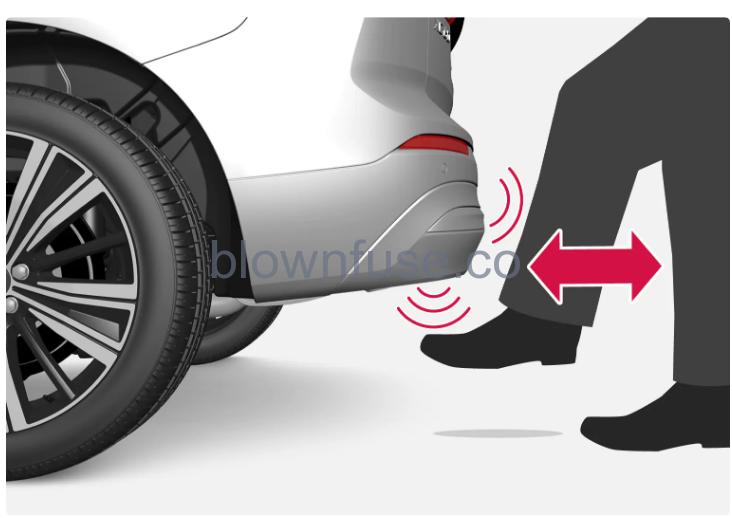
Make one forward kicking motion in the sensor area under the rear bumper. Then take a step back. The bumper must not be touched.
A short acoustic signal sounds when opening or closing is activated – the tailgate is opened/closed.
If several kicking motions take place without a key sufficiently close, the opening will not be possible until after a certain delay.
Do not leave your foot in the kicking motion under the car, this could cause the activation to fail.
Make one forward kicking motion while opening or closing is in progress.
Opening or closing the tailgate is stopped.
The key does not need to be in the vicinity of the car to cancel the opening or closing of the tailgate.
If the tailgate is stopped close to the closed position, the next activation will open the tailgate.
Unlocking the tailgate from the inside of the car

Press the![]() button on the instrument panel.
button on the instrument panel.
The tailgate is unlocked and can be opened from the outside.
With the power-operated tailgate option:(Option/accessory)
Hold the instrument panel’s ![]() button depressed for a couple of seconds.
button depressed for a couple of seconds.
The tailgate is opened.
Keyless unlocking of tailgate
(Option/accessory)
The tailgate is held closed by an electrical lock.
To open:
Press gently on the rubberized pressure plate beneath the tailgate handle.
The lock is released.
Lift by the outside handle in order to open the tailgate.
- Handle the rubber panel with care to avoid damage to its electrical contact. Minimal force is required for activation.
- Do not exert the lifting force on the rubber panel when opening – lift the handle.
It is also possible to unlock the tailgate with a foot movement (Option/accessory) under the rear bumper, see separate section.
Fuses in cargo area
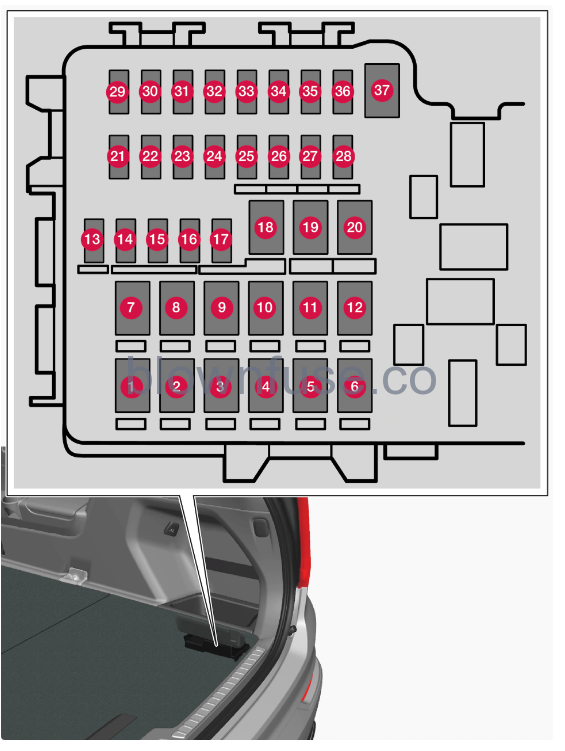
Special pliers are housed on the inside of the cover to facilitate replacement of tripped fuses.
The fuse box in the engine compartment also provides space for several spare fuses.
If a position has multiple table values, it is due to variations in equipment level. In which case, follow the value of the fuse being replaced. In the event of doubt – contact a workshop. An authorised Volvo workshop is recommended.
| Function | Ampere | Type | |
|---|---|---|---|
| Rear window defroster | 30 | MCase(This type of fuse should be replaced by a workshop. An authorised Volvo workshop is recommended) | |
| – | – | MCase(This type of fuse should be replaced by a workshop. An authorised Volvo workshop is recommended) | |
| Compressor, air suspension | 40 | MCase(This type of fuse should be replaced by a workshop. An authorised Volvo workshop is recommended) | |
| Electric additional heater, right rear | 30 | MCase(This type of fuse should be replaced by a workshop. An authorised Volvo workshop is recommended) | |
| – | – | MCase(This type of fuse should be replaced by a workshop. An authorised Volvo workshop is recommended) | |
| Electric additional heater, left rear | 30 | MCase(This type of fuse should be replaced by a workshop. An authorised Volvo workshop is recommended) | |
| Door module, right rear | 20 | MCase(This type of fuse should be replaced by a workshop. An authorised Volvo workshop is recommended) | |
| Control module for reduction of nitrous oxides (diesel) | 30 | MCase(This type of fuse should be replaced by a workshop. An authorised Volvo workshop is recommended) | |
| Power operated tailgate | 25 | MCase(This type of fuse should be replaced by a workshop. An authorised Volvo workshop is recommended) | |
| Door module, right rear | 20 | MCase(This type of fuse should be replaced by a workshop. An authorised Volvo workshop is recommended) | |
| Towbar control module(Option/accessory) | 40 | MCase(This type of fuse should be replaced by a workshop. An authorised Volvo workshop is recommended) | |
| Seatbelt pretensioner, right | 40 | MCase(This type of fuse should be replaced by a workshop. An authorised Volvo workshop is recommended) | |
| Internal relay coils | 5 | Micro | |
| Control module for reduction of nitrous oxides (diesel) | 15 | Micro | |
| Door module, left rear | 20 | Micro | |
| Alcohol lock(Option/accessory) | 5 | Micro | |
| – | – | Micro | |
| Towbar control module | 25 | MCase(This type of fuse should be replaced by a workshop. An authorised Volvo workshop is recommended) | |
| Accessory module | 40 | ||
| Door module, left front | 20 | MCase(This type of fuse should be replaced by a workshop. An authorised Volvo workshop is recommended) | |
| Seatbelt pretensioner, left | 40 | MCase(This type of fuse should be replaced by a workshop. An authorised Volvo workshop is recommended) | |
| Parking camera(Option/accessory) | 5 | Micro | |
| – | – | Micro | |
| – | – | Micro | |
| – | – | Micro | |
| – | – | Micro | |
| – | – | Micro | |
| – | – | Micro | |
| Seat heating, left rear(Option/accessory) | 15 | Micro | |
| – | – | Micro | |
| Blind Spot Information (BLIS)(Option/accessory.) | 5 | Micro | |
| – | – | Micro | |
| Seatbelt pretensioner, left | 5 | Micro | |
| Actuator, exhaust system | 5 | Micro | |
| – | – | Micro | |
| Control module All Wheel Drive (AWD)(Option/accessory) | 15 | Micro | |
| Seat heating, right rear(Option/accessory) | 15 | Micro | |
| – | – | MCase(This type of fuse should be replaced by a workshop. An authorised Volvo workshop is recommended) |
